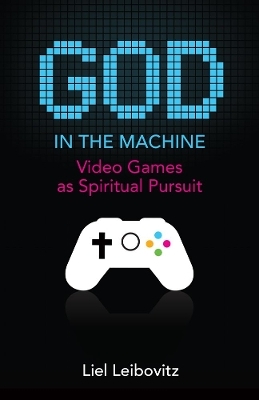
God in the Machine
Templeton Foundation Press,U.S. (Verlag)
978-1-59947-481-6 (ISBN)
- Titel z.Zt. nicht lieferbar
- Portofrei ab CHF 40
- Auch auf Rechnung
- Artikel merken
In God in the Machine, author Liel Leibovitz leads a fascinating tour of the emerging virtual landscape and its many dazzling vistas from which we are offered new vantage points on age-old theological and philosophical questions. Free will vs. determinism, the importance of ritual, transcendence through mastery, notions of the self, justice and sin, life, death, and resurrection all come into play in the video games that some critics so quickly write off as mind-numbing wastes of time. When one looks closely at how these games are designed, their inherent logic, and their cognitive effects on players, it becomes clear that playing these games creates a state of awareness vastly different from when we watch television or read a book. Indeed, the gameplay is a far more dynamic process that draws on various faculties of mind and body to evoke sensations that might more commonly be associated with religious experience. Getting swept away in an engaging game can be a profoundly spiritual activity. It is not to think, but rather to be, a logic that sustained our ancestors for millennia as they looked heavenward for answers.
As more and more of us look “screenward,” it is crucial to investigate these games for their vast potential as fine instruments of moral training. Anyone seeking a concise and well-reasoned introduction to the subject would do well to start with God in the Machine. By illuminating both where video game storytelling is now and where it currently butts up against certain inherent limitations, Liebovitz intriguingly implies how the field and, in turn, our experiences might continue to evolve and advance in the coming years.
Liel Leibovitz is a visiting assistant professor at NYU Steinhardt, focusing primarily on the video game and interactive media research and theory. Having received his PhD from Columbia University in 2007, Leibovitz continues to study the ontology of electronic gameplay, exploring such diverse issues as human-machine interaction, gaming and the construction of player subjectivity, and representations of death and violence in video games. He is a member of the advisory board of the New York chapter of the Digital Games Research Association, a founding member of the NYU Faculty Council on Games, and a member of the academic advisory board of the American Jewish Historical Society. He is also the author or co-author of several books, including, most recently, The Chosen Peoples: America, Israel, and the Ordeals of Divine Election, co-written with Todd Gitlin, as well as a contributor to newspapers and magazines such as the Los Angeles Times, the Atlantic, Dissent, and Tablet.
| Erscheint lt. Verlag | 26.5.2015 |
|---|---|
| Reihe/Serie | Acculturated |
| Verlagsort | Radnor |
| Sprache | englisch |
| Maße | 140 x 216 mm |
| Gewicht | 200 g |
| Themenwelt | Geisteswissenschaften ► Religion / Theologie |
| Informatik ► Weitere Themen ► Computerspiele | |
| Sozialwissenschaften ► Kommunikation / Medien ► Medienwissenschaft | |
| ISBN-10 | 1-59947-481-6 / 1599474816 |
| ISBN-13 | 978-1-59947-481-6 / 9781599474816 |
| Zustand | Neuware |
| Informationen gemäß Produktsicherheitsverordnung (GPSR) | |
| Haben Sie eine Frage zum Produkt? |
aus dem Bereich


